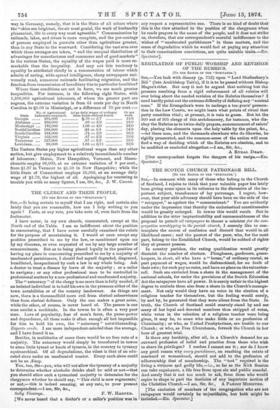THE CLERGY AND THEIR PEOPLE.
[To THE EDITOR OF THE "SPECTATOR."]
Sin,—It being certain to myself that I am right, and certain also lately that you are reasonable, how can 1 help writing to you again ? Facts, at any rate, you take note of, even facts from the foolometer.
I have never, in my own church, consecrated, except at the North end of the Table. I am so indifferent about the position in consecrating, that I have never carefully examined the rubric for the purpose of ascertaining it. I would at once accept any position prescribed to me by the law, or monitioned upon me by my diocesan, or even requested of me by any large number of communicants. But as to being placed legally in the position of having my place in consecrating prescribed to me by a majority of uneducated parishioners, I should feel myself degraded, disgraced, humiliated, incapacitated by such a law in my whole being. Ask a doctor to treat a disease by leave of the majority ; or a sailor to navigate ; or any other professional man to be controlled in professional matters by a non-professional and uneducated majority.
The" autocracy " of the clergy is no more than is fully needed, if an isolated individual is to hold his own in the presence either of the town notabilities or of the country landowner. As things are now, there is a thousandfold more evil from clerical subservience than from clerical defiance. Only the one makes a great noise, while the other, of course, is never heard of. The parson is one man amidst a multitude. In the towns he is often a very poor man. Love of popularity, fear of men's faces, the purse-power and dependence, all these make it often enough all but impossible for him to bold his own, the " autocracy " notwithstanding. Ezperto crede. I am more independent-minded than the average, and I have found it so.
Besides, in multitudes of cases there would be no free vote of a majority. The autocracy would simply be transferred in towns to some little tyrant or knots of tyrants, in the country to tyranny squirearchical. Of all degradations, the vilest is that of an edu- cated slave under an uneducated master. Every such slave could not be an fEsop.
You, too, Sir—you, who will not allow the tyranny of a majority to determine whether alcoholic drinks shall be Bold or not—that you should allow such a tyrannical majority to determine for the clergyman whether he should say, "This child is now regenerate,' or not,— this is indeed amazing, at any rate, to your present correspondent. —I am, Sir, &c., LWe never heard that a doctor's or a sailor's position was in
any respect a representative one. There is no kind of doubt that this is the view attached to the position of the clergyman when he reads prayers in the name of the people, and it does not strike us, therefore, that our correspondent's scornful indifference to the- wishes of "uneducated parishioners" in these matters, and the, sense of degradation which he would feel at paying any attention to their conscientious convictions, are quite amiable traits.—En.. Spectator].


































 Previous page
Previous page